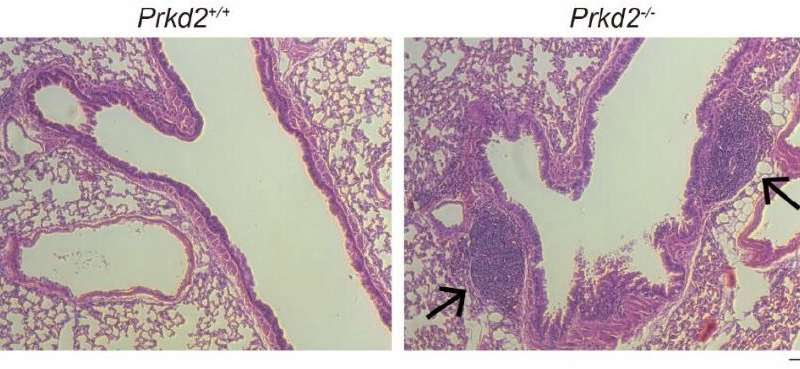by Bob Yirka , Medical Xpress
A team of researchers at the University of Texas Southwestern Medical Center has identified the gene responsible for controlling the activity of T follicular helper (TFH) cells. In their paper published in the journal Science Immunology, the group describes their study of the gene Prkd2 and what they learned about its role in autoimmune diseases.

Bronchus associated lymphoid tissues (BALT) – structures frequently observed in patients with autoimmune disease or allergies – spontaneously formed in the lungs of mice harboring a loss-of-function Prkd2 mutation (right), compared to controls (left). BALT are indicated by arrows. Credit: Misawa et al., Sci. Immunol. 5, eaaz0085 (2020)
Prior research has shown that erratic behavior of TFH cells (specialized T cells) can lead to problems with immune responses, which in turn can lead to autoimmune diseases. This is because TFH cells help B cells produce antibodies. In this new effort, the researchers identified the gene responsible for producing the enzyme that controls TFH activity— Prkd2.
Suspecting that Prkd2 plays a role in the development of autoimmune diseases, the researchers conducted a genetic screen with ENU-mutagenized mice. They found that those with Prkd2 gene mutations developed hypergammaglobulinemia. They next found that that a certain loss-of-function mutation reduced production of Prkd2W807R enzymes that controlled TFH cell behavior. Without the controlling enzyme, TFH cell centers developed excessive germinal centers (the parts of the cells that are used to help B cells), resulting in increased B cell activity. And that led to an increase in production of IgE antibodies—a symptom commonly seen in people with autoimmune diseases. The researchers also found that introducing a protein called Bcl6 (a known gene expression repressor) directly into T cells of mice that had the loss-of-function mutations also triggered excessive TFH development. And they found that if they immunized the mice, Bcl6 tended to repress expression by Prkd2 in TFH cells pushing them to mature faster.
Taking a closer look at the process, the researchers found that expression of Prkd2W807R, which under normal circumstances binds and phosphorylates Bcl6 as part of regulating TFH cells, led to repression of the nuclear translocation of Bcl6. Removal of Prkd2 allowed unrestricted translocation of Bcl6 and excessive activation of TFH. Such excessive activation, the researchers note, leads to both autoimmune diseases and allergies. If a compound could be found that increased Prkd2 activity, the researchers believe it might lead to treatments for both conditions.

Leave a Reply